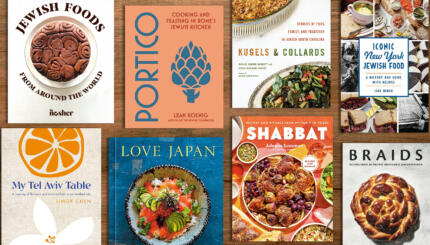“Raise game.” When I began rabbinical school, a friend of mine who was already ordained offered me these two words of wisdom when I asked for advice about how to handle the instantaneous increased authority that comes even from studying to be a rabbi. The point is clear: when more is expected, more must be delivered. Grow into the shoes you’re being given.
A rabbi is our quintessential token Jew. Unlike other forms of tokenization, this one is voluntary. Those of us who pursue a rabbinic path do so by choice. We’re signing up to be tokenized and scrutinized. We volunteer to be knowledgeable representatives of our religious culture. The title “Rabbi” is a giant “ask me” button.
Against this new backdrop of my everyday life as rabbinical student, I place my queerness. For me, my queer identity and my Jewish identity are inextricably linked; I process Judaism as a queer and trans individual and queerness as a Jewish one. My Jewish ethical sensibilities are improved by my queer understanding of marginal perspectives, and my queer politics are honed by my Jewish desire to build a better world. To me, these linked identities enrich each other.
At some points in life, I have fallen into roles where I have been tokenized as a member of the LGBTQ+ community. At others, I have done everything in my power to avoid that role. I feel quite fortunate that I am not constantly tokenized as a queer and trans person at school. Even when I have taken a leadership role in the LGBTQ+ community where I know I will be tokenized, I haven’t enjoyed the responsibility. And I think it comes back to these words: raise game.
As LGBTQ+ persons and our allies, we are constantly expected to raise game even to survive, let alone to move closer to full respect and inclusion for LGBTQ+ persons both within and outside the Jewish community. And, for the most part, we have done so. We have raised game to mitigate stigma, raised game to draw the world’s attention to AIDS epidemic, raised game to develop the politics of being out, raised game to fight for our basic human rights, raised game to reduce the suicide rate of our youth. And that’s just for starters. Now, as we face being governed by leaders who led the homophobic, biphobic, and transphobic backlash to the progress toward equality the LGBTQ+ community has made recently, we must again raise game to protect our gains and to move forward to our vision of full inclusion. We must not act as though our synagogues, Jewish youth groups, and Jewish community centers are immune to this backlash. Raising game is our only option.
I don’t think I’m alone in feeling weary from this fight. I go to bed at night exhausted and I wake up exhausted, dreading another day of fighting. I want to be done fighting for my rights; I just want to have them already. Compared to many LGBTQ+ Jews, my circumstances are fortunate. I wake up in a queer household every day, live in a city where not only is love love, but I can have identification that matches my presentation and people can use the restroom in which they are most comfortable. I have great queer (and even queer and Jewish) community and a supportive family, and the Jewish spaces where I worship and work are not only inclusive pro forma, but value the
I bring as my whole, out self. But it took a tremendous amount of effort to get to this point. Most days now, I have no idea where the strength to get through the day will come from. But I know I have to find it.
So I look to my elders. Elders, deeply human sources of cultural wisdom and experience, are the touchstones of both queer and Jewish culture, passing the torch to those who come after them. When times get tough, or even when they’re not so tough, we call on our elders and their merits for assistance. As LGBTQ+ Jews and allies, we face an uncertain future, and, when we are weary, we can look to our elders. Though we may be twice blessed by celebrating queer and Jewish culture, we are thrice blessed with elders because we have LGBTQ+ elders, Jewish elders, and LGBTQ+ Jewish elders. When we are weary from the fight, we can call upon their assets to keep us going for another day.
I want to share a short list of the queer and/or Jewish elders whose voices and lives grant me strength:
Kate Bornstein
Auntie Kate, as she is known by those who consider her an elder, is not a Keshet Jewish LGBTQ hero without reason. Her activism, both in smashing the gender binary and in encouraging people to #stayalive, has been critical in my life. She reminds me on a daily basis of her basic rule: don’t be mean. If I focus on that, the rest will follow.
Pete Buttigieg
Pete Buttigieg is the mayor of my hometown of South Bend, Indiana. Coming out publicly as a gay man while seeking reelection, he wrote one of the best pieces I have ever encountered on the importance of being out. Mayor Pete and his partner Chasten Glezman demonstrate daily that South Bend is a place where LGBTQ+ people can enjoy a great life free from institutional discrimination; South Bend has a non-discrimination ordinance which covers sexual orientation and gender identity. Mayor Pete is a public gay role model for South Bend’s youth, something neither he nor I had as a child.
Jill Hammer
My teacher, Rabbi Jill Hammer, is one of the most visionary Jewish leaders of our day. Her poetic voice and ritual creativity are rooted in the experiences of marginalization, especially rediscovering traditions that were written out of Judaism by the kyriarchy (especially the cishetpatriarchy part), often rituals that were the exclusive province of women. She and her wife, Shoshana Jedwab, are very proud parents of their amazing daughter. Her ingenuity reminds me that each of us has a unique voice that must be heard.
My teacher, Rabbi Benay Lappe, runs SVARA, a traditional radical Yeshiva. Rabbi Lappe creates an accessible learning environment where she teaches as a radical, queer document. When I discovered the book Lesbian Rabbis: The First Generation as a teen, I read her essay “Saying No in the Name of a Higher Yes” over and over. Both in her beit midrash and in her writing, I find her truth over and over: that LGBTQ+ Jews are just as entitled (and maybe even more connected) to Jewish texts as their cisgender straight counterparts. This truth propels me as I study to be a rabbi as an out queer and trans man with the full knowledge and permission of my rabbinical school.
J Mase III
J Mase III is a Black/trans/queer poet, activist, and educator and founder of awQward, a talent agency that is all black/trans led, for TQPOC (trans & queer folks of color). He embodies the kind of non-toxic masculinity I call mine. His poetic voice and his activism refuse to compromise his Black identity, his trans identity, or his queer identity, and thus provides a model of living out in multiple identities simultaneously. I can apply that to my queer, trans, and Jewish self.
Achy Obejas
Talented writer, translator, activist, and now academic Achy Obejas found a way of talking and writing frankly about identity, sexuality, and difference that influences the way I think about those aspects of life. Her embracing of every aspect of her identity, from being Cuban to having
heritage to her sexual history and identity, she is a living example not only of pride, but of love of self. Somehow, she has neutralized the shame that can paralyze us.
Julie Silver
By virtue of her having cousins in my area, I was exposed to Julie Silver’s music at a very early age. The resonance I felt then I can now attribute to relating to her music as a queer person. Her lyrics and melodies are about alienation and coming home, feeling different and finding peace. In the family she has created with her partner Mary Connelly, she lives out one of the best examples of “love is love” I have encountered.
Of course, this list only scratches the surface of the depth of our elder field. We are so blessed by the way our elders exemplify raising game. I want to end with a blessing for raising our game.
May the way these elders have raised game give us strength when we are weary. May the Holy One endow them with a holy persistence to continue their work, and may that persistence be contagious. May their divine sparks ignite ours and renew our commitment to doing the holy work of pursuing equality.
Nevarech et ma’ayan jayeinu, jei ha’olamim hanotein laya’ef koaj.
Let us bless the Source of our Lives, Life of the Multiverse, who gives strength to the weary.
May this be our blessing. Amen.


